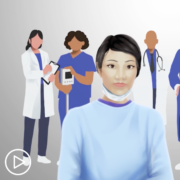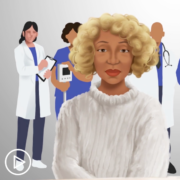Moving Past Small Cell Lung Cancer Stigma | A Patient Navigator Explains
Moving Past Small Cell Lung Cancer Stigma | A Patient Navigator Explains from Patient Empowerment Network on Vimeo.
Diana is a patient navigator who assists small cell lung cancer (SCLC) patients from the stages of screening through follow-up care. Diana explains SCLC risk factors, patients commonly diagnosed with extensive stage SCLC, and barriers to care. She shares the origin of some stigma about lung cancer. “Past TV ads to stop smoking built a stigma around cigarette smoking that has created an environment of blame around lung cancer.” She discusses how patients can stay [ACT]IVATED in their care and in improving future treatments.
Disclaimer: Thank you to small cell lung cancer expert Dr. Rafael Santana-Davila, PEN’s Empowerment Leads, patients, and care partners for reviewing and collaborating on this video. This video has been edited to protect the privacy of certain individuals, and the names and identifying details have been changed.
See More from [ACT]IVATED Small Cell Lung Cancer (SCLC)
Related Resources:

|

|

|
Transcript:
My name is Diana, I’m a patient navigator. I help patients navigate screening, diagnosis, treatment, and follow-up care for small cell lung cancer.
Small cell lung cancer (SCLC) makes up about 15 percent of lung cancer in the U.S. Many of these patients are diagnosed with extensive stage small cell lung cancer (ES-SCLC). Though being a current or former smoker increases the risk of SCLC, patients who were exposed to secondhand smoke, workplace carcinogens, environmental pollution, or other factors are also at-risk for SCLC.
Even though smoking is a major risk factor for SCLC, nobody deserves to get cancer. Nicotine is an addictive substance that is extremely difficult for many smokers to quit – especially for those who started at a very young age. Past TV ads to stop smoking built a stigma around cigarette smoking that has created an environment of blame around lung cancer. The stigma is many times greater for extensive stage small cell lung cancer patients.
Patients diagnosed with SCLC can come from a variety of ethnic, racial, and social classes. However, patients from underrepresented communities of Black Indigenous People of Color (BIPOC), low socioeconomic, and LGBTQ+ groups often take on the brunt of inequitable care in the form of limited access to quality care, lack of healthcare insurance, and other barriers to care.
Remember that you are the patient, and you have a choice in your treatment options depending on your goals for treatment and quality of life – no matter how you got the cancer. So stay encouraged as investments in SCLC research continue to fuel hope.
My [ACT]IVATION tips are:
- Make sure you have a full picture of available treatment options.
- Help educate others to raise awareness of SCLC; advocate for improved care.
- Inquire about small cell lung cancer clinical trials to help researchers discover new and refined treatments.
With these [ACT]IVATION tips in mind, remember, as a patient staying ACTIVATED in your cancer care is essential to becoming informed, empowered, and engaged in your care.
Share Your Feedback:
Create your own user feedback survey









